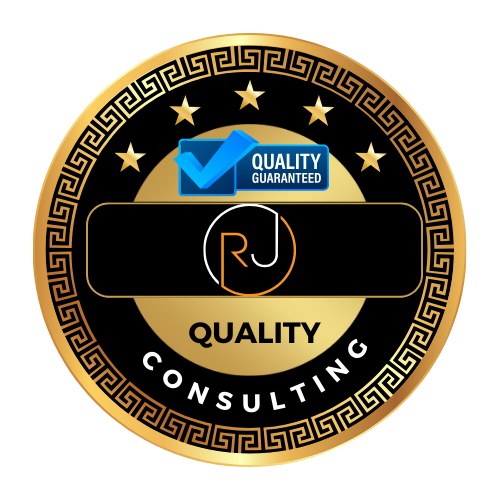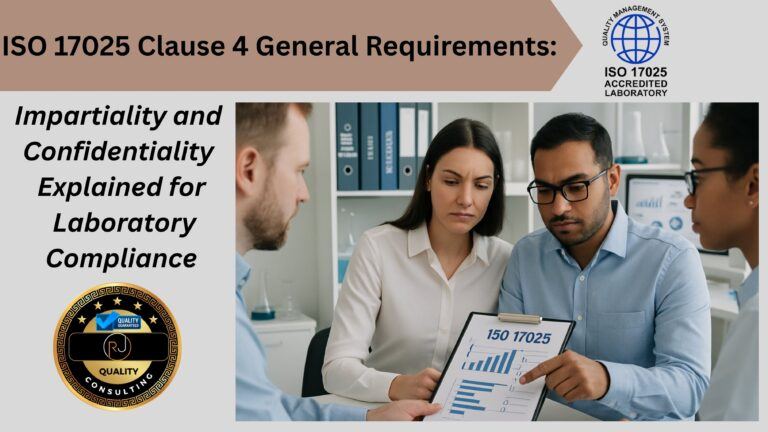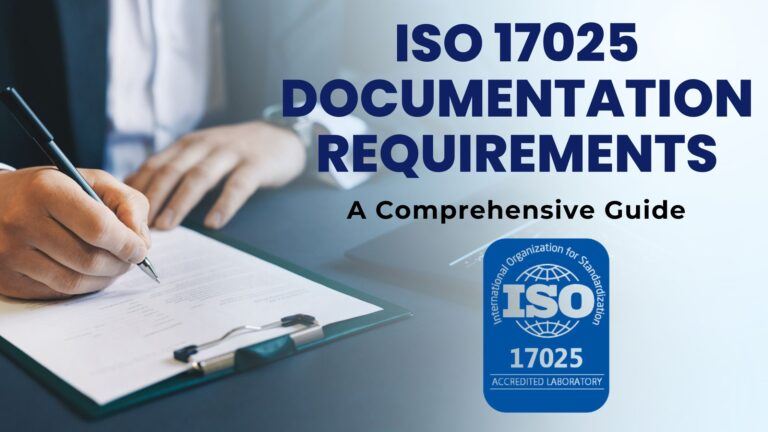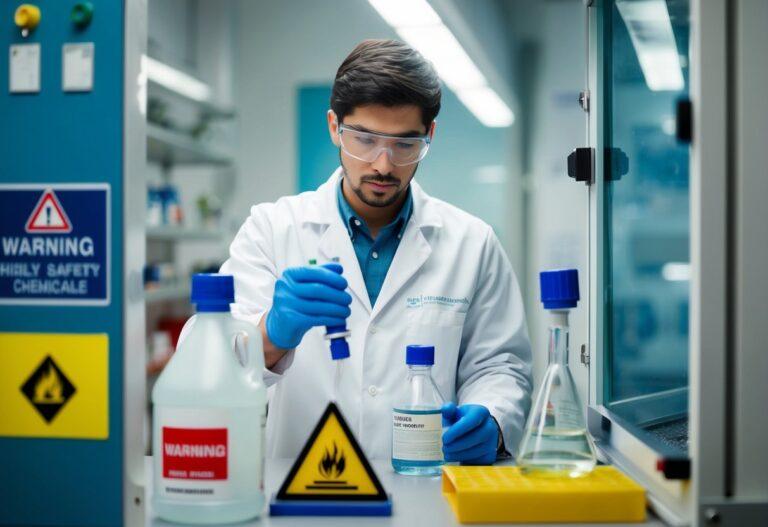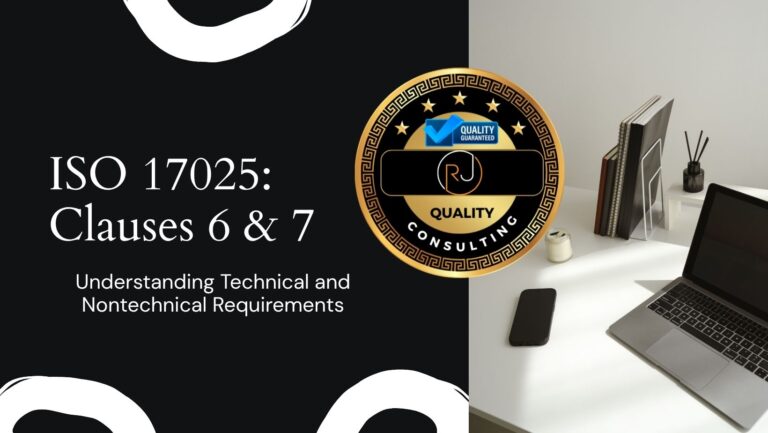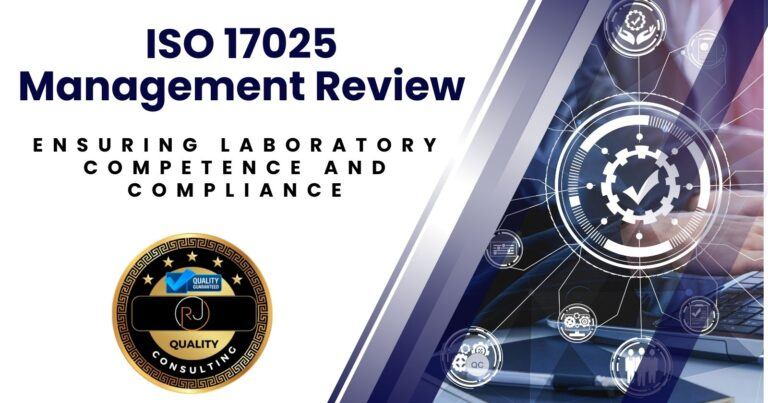ISO 17025 Auditor Training Courses: Essential Certification for Laboratory Quality Assurance
ISO 17025 Auditor Training Courses equip laboratory professionals with essential skills to conduct internal audits effectively. These courses cover key aspects of the ISO/IEC 17025 standard, focusing on quality management systems for testing and calibration laboratories. Participants learn how to plan, execute, and report audit findings to ensure compliance and drive continuous improvement.
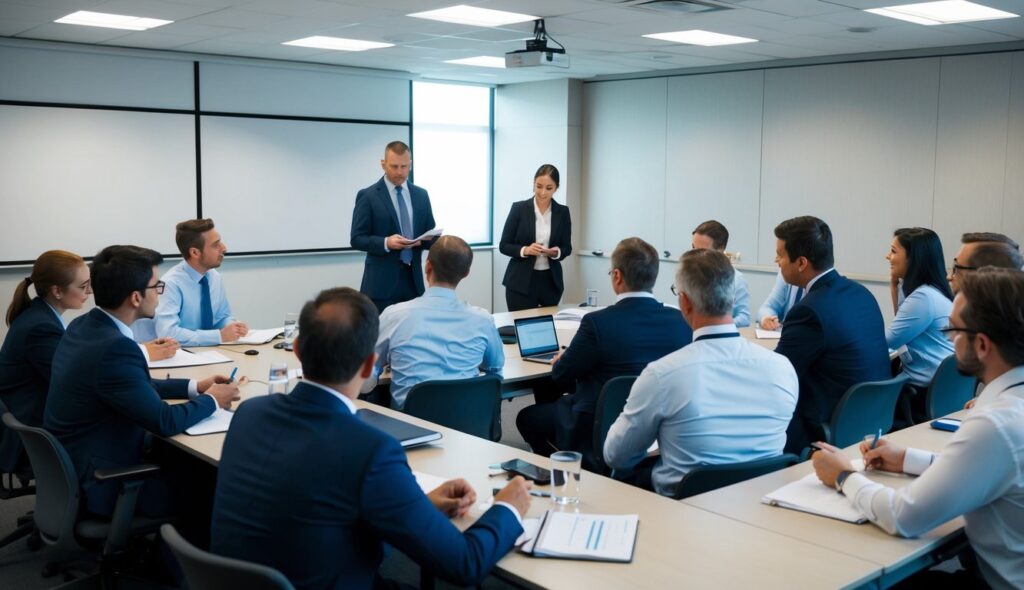
The training provides a deep dive into audit techniques, including evidence collection, observation documentation, and effective questioning. Attendees gain practical knowledge through interactive activities, case studies, and hands-on exercises. This approach helps them understand technical issues related to audits and apply their learning in real-world scenarios.
ISO 17025 Auditor Training Courses are valuable for laboratory staff, quality managers, and those seeking career advancement in laboratory quality assurance. The skills gained from these courses contribute to maintaining high standards in laboratory operations and fostering a culture of quality and compliance and can enhance other ISO 17025 training courses that quality managers may embrace.
Key Takeaways
- ISO 17025 Auditor Training Courses teach essential skills for conducting effective internal audits in laboratories
- Participants learn to plan, execute, and report audit findings to ensure compliance with ISO/IEC 17025 standards
- The courses combine theory and practical exercises to prepare auditors for real-world laboratory quality management challenges
Understanding ISO/IEC 17025 Standard
ISO/IEC 17025 sets standards for testing and calibration labs. It covers key areas like quality management and technical competence. Labs use this standard to show they can produce reliable results.
Overview of ISO/IEC 17025
ISO/IEC 17025:2017 is the latest version of this standard. It applies to all types of labs, big or small. The standard helps labs prove they work in a consistent, high-quality way.
Labs that follow ISO 17025 can show they are good at what they do. This can help them get more business and trust from clients. The standard covers both management and technical parts of lab work.
It focuses on things like staff skills, equipment, and test methods. These all play a part in getting accurate results.
ISO 17025 General Requirements for the Competence of Testing and Calibration Laboratories
ISO 17025 sets rules for how labs should operate. It asks labs to be fair and not show bias in their work. Labs must keep their methods up-to-date and use good science.
Staff need to be well-trained and know their jobs. Equipment must work right and be checked often. The standard also talks about how to handle samples and data.
Labs have to show they can get reliable results time after time. They need to take part in skill tests with other labs. This helps prove their methods work well.
Documentation and Management System Documents
Good record-keeping is a big part of ISO 17025. Labs must have clear, written procedures for all their work. This includes test methods, equipment use, and reporting results.
The lab needs a quality manual that explains how they follow the standard. They also need to keep records of all tests, staff training, and equipment checks.
Document control is key. This means making sure everyone uses the latest versions of procedures. It also means keeping old records safe and easy to find when needed.
Planning and Conducting Internal Audits

Internal audits are key for ensuring labs meet ISO 17025 standards. They help find areas to improve and check if processes are working well.
Principles of Auditing
Auditors must be fair and unbiased. They look at facts and follow a clear process. Good auditors are curious and ask questions to learn more.
Audits should focus on important areas that affect quality. Auditors need to be respectful and keep information private. They must also be open to new ideas.
Teamwork is vital. Auditors work with lab staff to find ways to make things better. The goal is to help, not to criticize.
Audit Planning and Preparation
Planning is crucial for a good audit. The audit team picks which areas to check. They set dates and make a schedule.
Auditors review past reports and lab documents. This helps them know what to look for. They make a list of questions to ask during the audit.
The team tells the lab staff about the audit plan. This gives everyone time to get ready. Good planning makes the audit run smoothly.
Collecting Audit Evidence
Auditors gather proof during the audit. They watch how work is done and talk to staff. They also look at records and test results.
They use different methods to collect info:
- Interviews with lab workers
- Checking documents and data
- Watching lab processes
Auditors take notes on what they see and hear. They compare what they find to ISO 17025 rules. This helps them spot any problems.
Document Observations and Audit Findings
Auditors write down what they find. They note both good practices and areas that need work. Each finding should be clear and based on facts.
They group findings into categories:
- Major issues that need quick fixes
- Minor problems to improve over time
- Good practices to share
The audit report lists all findings. It explains what was checked and what needs to change. This report helps the lab make plans to get better.
Auditor Skills and Competencies

ISO 17025 auditors need key skills to perform their role well. These include asking good questions, knowing auditing rules, and dealing with audit findings.
Effective Questioning Techniques
Auditors must ask clear questions to get useful information. They should use open-ended questions to learn more details. Closed questions help confirm specific facts. Active listening is important to understand responses fully.
Auditors should avoid leading questions that might bias answers. They need to stay neutral and not make assumptions. Good follow-up questions dig deeper into important topics. Paraphrasing answers can check if the auditor understood correctly.
Auditing Requirements and Methods
Auditors must know ISO 17025 standards well. They follow set methods to check if labs meet these rules. This includes reviewing documents, watching work being done, and talking to staff.
Planning is key for a smooth audit. Auditors make checklists of what to check. They set a clear schedule and scope. During the audit, they gather proof through notes and samples. Good record-keeping is vital to back up any findings.
Managing Audit Results and Non-Conformities
After the audit, auditors must clearly report their findings. They explain any issues found, called non-conformities. These are ranked by how serious they are. Auditors suggest ways to fix problems.
Follow-up is important to make sure labs make needed changes. Auditors may do extra checks later. They look at root causes of issues to prevent them from happening again. Good auditors help labs improve, not just find faults.
ISO 17025 Auditor Training Methods

ISO 17025 auditor training comes in different formats to suit various learning styles and schedules. These methods aim to equip students with the skills needed for effective laboratory auditing.
Classroom-Based vs. Virtual Classes
Classroom-based and virtual classes both offer benefits for ISO 17025 auditor training. In-person courses allow face-to-face interaction with instructors and peers. This setup helps with hands-on learning and immediate feedback.
Virtual classes provide flexibility. Students can join from anywhere with an internet connection. This option saves time and travel costs. Many virtual courses use video conferencing and online tools to create an interactive experience.
Both methods cover key topics like audit planning, evidence collection, and report writing. The choice often depends on personal preference and availability.
Open Classroom and Tutor-Led Virtual Classroom Approaches
Open classroom courses let students learn at their own pace. Materials are available online, and learners can access them anytime. This method works well for self-motivated individuals with busy schedules.
Tutor-led virtual classrooms offer structure and guidance. An instructor leads sessions in real-time. Students can ask questions and get immediate answers. This approach combines the benefits of traditional teaching with online convenience.
Both methods can include group discussions and case studies. These help students apply ISO 17025 concepts to real-world scenarios.
Utilization of Quizzes and Practical Exercises
Quizzes and practical exercises are key parts of ISO 17025 auditor training. They help reinforce learning and test understanding.
Quizzes often cover theoretical aspects of the standard. They might include multiple-choice questions about audit principles or ISO 17025 requirements.
Practical exercises simulate real audit situations. Students might review mock laboratory records or practice writing audit reports. These activities build confidence and skills needed for actual audits.
Many courses use a mix of quizzes and exercises throughout the training. This approach helps students track their progress and identify areas for improvement.
Continuous Improvement and Corrective Actions

ISO 17025 auditor training courses teach ways to boost lab quality over time. A key focus is on finding and fixing problems.
Auditors learn to spot issues during inspections. They check if the lab follows ISO 17025 rules. When they find problems, they suggest fixes.
These fixes are called corrective actions. They aim to stop issues from happening again. Auditors help labs make plans to put these fixes in place.
Training also covers how to track if fixes work. Auditors learn to check if changes really solve problems. This helps labs keep getting better.
Courses teach about the lab’s quality management system too. Auditors find out how to use this system to drive ongoing improvements.
Writing clear audit reports is another important skill. Good reports help labs understand what to fix and how to do it.
By learning these skills, auditors can help labs:
- Find and fix problems fast
- Stop issues before they start
- Keep making their work better
- Meet ISO 17025 rules
This focus on always getting better is at the heart of ISO 17025. It helps labs stay up-to-date and do high-quality work.
Roles and Responsibilities within the Laboratory
ISO 17025 audits involve key staff members who play crucial parts in ensuring quality and compliance. Each role has specific duties that contribute to the lab’s overall success.
Laboratory Managers
Laboratory managers oversee all aspects of lab operations. They set quality policies and make sure the lab follows ISO 17025 standards. They also need to ensure the laboratory staff undergoes ISO 17025 training for laboratories that are specific to the task they perform day in and day out.
Managers pick team members for audits and give them the resources they need. They review audit results and approve plans to fix any problems found.
These leaders also work with outside groups during assessments. They must understand how audits affect the lab’s work and reputation.
Technical Staff and Their Role in Audits
Technical staff are the hands-on experts in a lab. They do the daily testing and keep equipment running well.
During audits, these workers show how they do their jobs. They explain methods and share records of their work.
Technical staff must:
- Know the right ways to do tests
- Keep good notes
- Follow safety rules
- Report any issues they find
Their input helps auditors see if the lab is doing things right.
Quality Managers and Their Involvement
Quality managers make sure the lab sticks to ISO 17025 rules. They plan internal audits and help fix any problems found.
These managers train staff on quality topics. They keep track of all lab processes and look for ways to make them better.
Quality managers also:
- Write and update quality manuals
- Check that staff follow procedures
- Help prepare for external audits
- Work with lab managers to improve systems
They act as a link between auditors and lab staff, helping everyone understand audit findings.
Certification and Career Advancement
ISO 17025 auditor training courses offer valuable certification opportunities. After completing the training, participants can earn a globally recognized ISO 17025 Lead Auditor certificate. This credential shows their expertise in quality management for testing and calibration laboratories.
The certification opens doors to new career paths. Certified auditors can work for accreditation bodies, consulting firms, or large organizations with in-house laboratories. They may conduct internal or external audits to ensure compliance with ISO 17025 standards.
Career advancement is a key benefit of ISO 17025 certification. Auditors can move into senior quality management roles or become lead auditors. Some may even start their own consulting businesses, helping labs improve their processes.
ISO 17025 knowledge complements other quality management systems like ISO 9000. This broader expertise makes certified auditors more valuable to employers. They can help organizations integrate different quality standards for better overall performance.
The skills gained through ISO 17025 training are transferable to many industries. Certified auditors can work in sectors such as:
- Pharmaceuticals
- Food testing
- Environmental monitoring
- Automotive testing
- Aerospace
Employers often prefer or require ISO 17025 certification for quality-related positions. This makes the training a smart investment for career growth in laboratory and quality management fields.
Implementing Training Insights into Laboratory Practice
Applying audit training to real-world lab settings helps improve quality and compliance. Effective use of tools like checklists and case studies can enhance audit processes and outcomes.
Utilizing Audit Checklists Effectively
Audit checklists are key tools for ISO 17025 compliance. They help auditors cover all needed areas during an assessment. Good checklists break down complex standards into clear, actionable items.
Labs can create custom checklists based on their specific processes. This ensures all relevant points are checked. Checklists should be updated as lab procedures change.
Using digital checklists can streamline the audit process. They allow for easy data entry and report generation. This saves time and reduces errors.
Case Studies and Real-world Applications
Case studies offer practical examples of ISO 17025 audits in action. They show how labs have solved common issues and improved their systems.
Real-world cases can cover topics like:
- Fixing non-conformities
- Improving sample handling
- Updating equipment calibration methods
Studying these examples helps labs prepare for their own audits. It also gives ideas for process improvements.
Labs can create their own case studies too. This helps track progress and share knowledge within the organization. It’s a great way to learn from past audits and prevent repeat issues.
Consulting and External Resources
ISO 17025 auditor training often involves external help. Many labs seek expert guidance to prepare for audits and improve their systems.
Consultants play a key role in this process. They bring deep knowledge of ISO 17025 standards and audit procedures. These experts can spot gaps in a lab’s practices and suggest fixes.
ISO 17025 training programs are widely available. They cover topics like:
- Understanding the standard
- Audit planning and execution
- Report writing
- Follow-up actions
Labs can find both in-person and online courses. These programs help staff learn the ins and outs of ISO 17025 compliance.
Management system documents are crucial for ISO 17025 audits. Consultants can help labs create or improve these materials. Key documents include:
- Quality manuals
- Standard operating procedures
- Work instructions
- Records and forms
External resources like templates and software tools can streamline document management. These aids help labs organize their systems and prepare for audits more efficiently.
Professional associations and accreditation bodies also offer valuable resources. They provide guides, webinars, and networking opportunities for lab professionals seeking to enhance their audit skills.
Auditor training is only one part of your overall education strategy. For a broader look at options for your whole team, see my guide on ISO 17025 training courses, which compares general awareness, implementation, and internal auditor courses—many of them fully online.
Frequently Asked Questions
ISO 17025 auditor training courses raise many common questions. Here are answers to some key inquiries about certification, prerequisites, costs, and career opportunities.
How can I become certified as an ISO 17025 auditor?
To become a certified ISO 17025 auditor, complete an accredited training course. Take and pass the final exam. Gain practical auditing experience through on-the-job training. Apply to a certification body and meet their requirements.
What are the prerequisites for enrolling in an ISO 17025 auditor training course?
Most courses require basic knowledge of quality management systems. Some expect familiarity with laboratory operations. A background in science or engineering can be helpful. Check specific course requirements before enrolling.
Are there any ISO 17025 auditor training courses available for free?
Free ISO 17025 auditor courses are rare. Some organizations offer introductory webinars at no cost. These provide basic info but don’t lead to certification. Paid courses are needed for full training and certification.
What is the average cost of participating in ISO 17025 training programs?
ISO 17025 training costs vary. Prices range from $500 to $3000 for most courses. Factors affecting cost include course length, location, and provider. Online courses may be less expensive than in-person training.
How is ISO 17025 Lead Auditor Training different from standard auditor training?
Lead Auditor training is more in-depth than standard auditor courses. It covers audit team leadership and management. The course is longer and often more expensive. Lead Auditor certification allows professionals to head audit teams.
What are the opportunities available after obtaining ISO 17025 auditor certification?
Certified ISO 17025 auditors can work for certification bodies. They may find jobs in testing and calibration laboratories. Consulting firms often hire ISO 17025 auditors. Some auditors start their own consulting businesses.
🕒 Book Your Free 45-Minute Consultation
Have questions about ISO/IEC 17025 or ISO 9001 implementation or accreditation? Schedule a free 45-minute consultation with me to discuss your Company or laboratory’s needs and how we can achieve compliance together.
Schedule Your Consultation